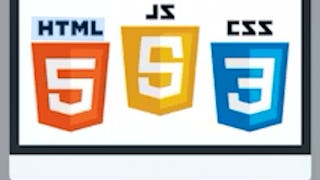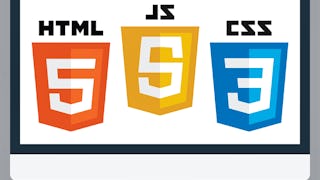Filter by
SubjectRequired
LanguageRequired
The language used throughout the course, in both instruction and assessments.
Learning ProductRequired
LevelRequired
DurationRequired
SkillsRequired
SubtitlesRequired
EducatorRequired
Explore the AJAX Course Catalog
 Status: Preview
Status: PreviewBoard Infinity
Skills you'll gain: Ajax, jQuery, Web Applications, Javascript and jQuery, JSON, Extensible Markup Language (XML), Javascript, Web Development Tools, Event-Driven Programming, Application Programming Interface (API), Network Protocols
 Status: Free Trial
Status: Free TrialJohns Hopkins University
Skills you'll gain: Cascading Style Sheets (CSS), HTML and CSS, Javascript, Ajax, Responsive Web Design, Bootstrap (Front-End Framework), Front-End Web Development, Web Design, Hypertext Markup Language (HTML), Browser Compatibility, Web Design and Development, Web Development, JSON, Web Applications, Scripting, Usability, Cross Platform Development, Object Oriented Programming (OOP), Event-Driven Programming, User Interface and User Experience (UI/UX) Design
 Status: Free Trial
Status: Free TrialSkills you'll gain: Server Side, Restful API, Apache, Full-Stack Web Development, API Design, Node.JS, Web Servers, Postman API Platform, Authentications, Application Servers, Application Programming Interface (API), Web Applications, Back-End Web Development, Secure Coding, Web Development Tools, Web Development, Javascript, JSON, Application Security, PHP (Scripting Language)
 Status: Preview
Status: PreviewCoursera Instructor Network
Skills you'll gain: Ajax, JSON, JavaScript Frameworks, Javascript, Application Programming Interface (API), Restful API, Web Applications, Real Time Data, Application Security
 Status: Free Trial
Status: Free TrialJohns Hopkins University
Skills you'll gain: Javascript, Ajax, JSON, Web Applications, Web Development, Scripting, Hypertext Markup Language (HTML), Object Oriented Programming (OOP), Event-Driven Programming, Web Services, Prototyping, Network Protocols
 Status: Free Trial
Status: Free TrialSkills you'll gain: Ajax, Javascript, Data Structures, Debugging, JSON, Scripting, Web Development, Web Applications, Computer Programming, HTML and CSS, Software Development, Object Oriented Programming (OOP), Git (Version Control System), Application Programming Interface (API)
What brings you to Coursera today?
 Status: Free Trial
Status: Free TrialUniversity of Michigan
Skills you'll gain: jQuery, Ajax, JSON, Django (Web Framework), Javascript, Object Oriented Programming (OOP), Web Development Tools, Debugging
 Status: Free Trial
Status: Free TrialBoard Infinity
Skills you'll gain: Javascript and jQuery, jQuery, Javascript, Interactive Design, HTML and CSS, Web Design and Development, User Interface (UI), Event-Driven Programming, Web Development Tools, Scripting, Scripting Languages, Programming Principles, Debugging
 Status: Free Trial
Status: Free TrialSkills you'll gain: Istio, Node.JS, Software Development Life Cycle, Software Architecture, Kubernetes, Server Side, Application Deployment, CI/CD, Cloud-Native Computing, React Redux, Responsive Web Design, NoSQL, OpenShift, Restful API, Git (Version Control System), Cloud Applications, Ajax, Javascript, Azure DevOps, Engineering Software
 Status: NewStatus: Free Trial
Status: NewStatus: Free TrialSkills you'll gain: Extensible Markup Language (XML), Ajax, Extensible Languages and XML, Web Design, Java Platform Enterprise Edition (J2EE), Cascading Style Sheets (CSS), Data Validation, Web Applications, Scripting, Javascript and jQuery, Web Development, Android Development, Hypertext Markup Language (HTML), Middleware, Model View Controller, Web Services, Hibernate (Java), Visualization (Computer Graphics), Java, Mobile Development
 Status: Free Trial
Status: Free TrialSkills you'll gain: Node.JS, Server Side, React Redux, Restful API, React.js, Front-End Web Development, JavaScript Frameworks, Back-End Web Development, Ajax, MongoDB, NoSQL, Javascript, UI Components, Data Structures, Debugging, Authentications, Full-Stack Web Development, Web Applications, Application Programming Interface (API), Scalability
 Status: NewStatus: Free Trial
Status: NewStatus: Free TrialSkills you'll gain: User Interface (UI), Application Development, Large Language Modeling, Generative AI, Semantic Web, Query Languages, Artificial Intelligence, Performance Tuning, Data Processing, Database Management Systems, Natural Language Processing, Scalability
In summary, here are 10 of our most popular ajax courses
- Ajax Basics: Board Infinity
- HTML, CSS, and Javascript for Web Developers: Johns Hopkins University
- AJAX Next Level: Authentication, Servers, Projects & More: Packt
- AJAX for Web Developers: Coursera Instructor Network
- Introduction to Javascript and Ajax: Building Web Apps: Johns Hopkins University
- JavaScript Programming Essentials: IBM
- Using JavaScript and JSON in Django: University of Michigan
- JavaScript for Web Development: Board Infinity
- IBM Full-Stack JavaScript Developer: IBM
- Advanced XML Integration and Project Applications: EDUCBA










